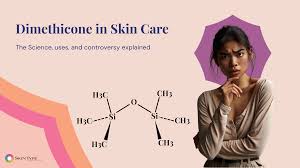
The Science of Dimethicone in Skin Care
Dimethicone is a silicone based ingredient that used to be prized for its texture enhancing properties in skin care. Despite its widespread use and popularity, concerns regarding its potential impact on skin health and the environment have led many companies and consumers to avoid dimethicone in skin care. Find out why more people are looking for dimethicone-free products every day, and learn the science of dimethicone here!
If you didn’t already know; the best way to know if a product or ingredient is right for you is to take the Baumann Skin Type quiz for free!
Keep reading to find out how dimethicone works, and why some people avoid it in skin care.
What is Dimethicone?
Dimethicone is a silicon-based polymer, more commonly known as silicones. Its name indicates that it is a silicone based molecule with two methyl groups. (Di=2, methi=methyl, cone=silicon). When you look at it’s structure above, you can see that an oxygen binds two silicon based molecules into one molecule.
This compound has a smooth texture and historically was common in moisturizers and other creamy feeling products. Recently, this ingredient is becoming less popular because of its environmental impact and an influx of great alternatives. If you are interested in moisturizers without dimethicone, you can see our full collection here!
We also have a complete collection of sunscreens and other SPF products without dimethicone, here!
Before we get into why dimethicone is falling out of favor, it is important to understand why it was used in the first place.
Why Dimethicone is used in Skin Care Products
Dimethicone has been used as a texture additive in cosmetic and skin care products for decades. Though it is not in vogue anymore, these are some of the reasons dimethicone was popular in the past:
Moisturizers: By creating a protective layer on the skin, dimethicone help prevent moisture loss, keeping your skin hydrated.
Smooth finish: It creates a silky texture in skincare formulations, leaving a non-greasy finish. Dimethicone doesn’t have the same oiliness as many other creamy ingredients.
Protective Qualities : Dimethicone acts as a barrier against environmental pollutants, helping to shield the skin from external irritants like dirt or smog.
Wrinkle Smoothing : Its ability to fill in fine lines and wrinkles temporarily gives the skin a smoother appearance, a sought-after quality in anti-aging skincare products. It doesn’t actually help with the causes of aging. It’s kind of like using frosting to fill a crack in a wall; It is a very temporary solution.
Understanding these benefits provides insights into why dimethicone has been a preferred ingredient for years. However, the evolving landscape of skincare is marked by a heightened focus on ingredient safety and environmental responsibility. Because of these responsibilities we have to each other and the environment, some people are looking beyond dimethicone.
Why is Dimethicone considered bad?
Dimethicone has gone from a skin care staple to a pariah because of individual skin health concerns and broader environmental implications. Here’s why some consumers and formulators are looking beyond dimethicone:
Potential for Skin Irritation : While relatively rare, there are instances where dimethicone can cause skin irritation or allergic reactions. While only those with extremely sensitive skin have to worry about this issue, it is still notable.
Comedogenicity : Dimethicone’s occlusive nature means it can, in some cases, trap sebum, dirt, and other impurities under the skin. This concern is particularly relevant for individuals with oily or acne-prone skin types. That’s why it’s so important to know your Baumann Skin Type!
Environmental Impact : Dimethicone is not biodegradable. When disposed of, dimethicone does not break down naturally. Some risks to marine life are particularly notable. This ingredient is a major contributor to the larger discussion on the cosmetic industry’s environmental footprint.
Concerns for oral use: Studies by the Cosmetic ingredient review panel demonstrated that when consumed orally, male test subject demonstrated a decrease in muscle mass and the teste size. These results were specific to oral use, however. Using dimethicone on the skin does not seem to cause this same shrinkage.
Dimethicone alternatives
Advances in green chemistry and biotechnology have made alternatives to dimethicone much more accessible. New and old ingredients alike are getting more focus in skin care as dimethicone falls out of favor. Some of the most promising alternatives in my opinion are:
Plant-Based Oils: Ingredients derived from natural sources such as sunflower oil, coconut oil, marula oil, rosehip oil, and more offer a promising path, providing similar benefits in terms of skin feel and hydration, with a significantly lower environmental impact.
Biodegradable Silicones : Innovation in silicone chemistry has led to the development of biodegradable silicones that have almost exactly the same benefits as dimethicone, without the environmental impact.
Dimethicone for hair care
Dimethicone for Hair care
While dimethicone’s presence in skincare has been widely discussed, its application in hair care products deserves a spotlight as well. Known for its conditioning properties and ability to enhance hair texture, dimethicone is a popular ingredient in shampoos, conditioners, and styling products. However, as with its use in skincare, understanding how it works and when it might be best avoided can help consumers make informed choices.
Benefits of Dimethicone in hair care
While the concerns around dimethicone are not to be forgotten about, there are a number of benefits for hair that are commonly attributed to dimethicone:
Smoothness and Shine : Dimethicone coats the hair strands, creating a smooth and shiny appearance. This effect not only makes hair shiny, but also helps in detangling and reducing frizz.
Protection : By forming a protective barrier around the hair shaft, dimethicone can shield hair from environmental aggressors such as pollutants and UV rays. This barrier can help maintain hair health and prevent damage.
Moisture Retention : Similar to its role in skincare, dimethicone helps lock in moisture, which can be particularly beneficial for dry and damaged hair, aiding in hydration and preventing further moisture loss.
Enhanced Conditioning : It is a key ingredient in many conditioners and deep conditioning treatments, where it contributes to the overall softness and manageability of hair, making styling easier and more effective.
Dimethicone’s contribution to hair care demonstrates its versatility as an ingredient in beauty and personal care formulations. While it offers considerable benefits, awareness of its potential drawbacks is essential for hair health. As the beauty industry continues to evolve, the development of innovative, sustainable alternatives will likely provide new opportunities for achieving the desired hair care results without compromising on environmental values or hair health.
Risks of dimethicone in hair care
Despite its advantages, the use of dimethicone in hair care products comes with considerations that users should be aware of:
Buildup Potential : Over time, dimethicone can accumulate on the hair shaft, leading to buildup that can weigh hair down and make it appear limp. This buildup may require specific types of clarifying shampoos to remove, which can strip natural oils from the hair and scalp.
Porosity and Hair Type Sensitivity : The impact of dimethicone varies depending on hair type. While it may benefit those with thick, coarse hair by providing much-needed moisture and frizz control, individuals with fine hair might find it too heavy, leading to a greasy appearance and lack of volume.
Environmental Concerns : Similar to the concerns raised in skincare, the environmental impact of dimethicone, due to its non-biodegradable nature, extends to its use in hair care products. These concerns highlight the need for sustainable practices and alternatives in product formulation.
Some alternatives to dimethicone for hair care are: argan oil, coconut oil, cocoa butter, safflower oil, sesame oil, and these cleansing oils.
Choosing the best skin care
Choosing the best skin care
A nuanced understanding of ingredients like dimethicone allows for informed skincare choices that balance personal health goals with ethical and environmental considerations. Personalized skincare, informed by frameworks such as the Baumann Skin Types, is crucial in navigating these choices effectively. You can find your skin type for free today with the Baumann Skin Type Quiz!
Conclusion
The discussion around dimethicone reflects a broader movement toward informed, conscious skin care. From the drama around this ingredient, we can see that our impact on the environment is important to manufacturers and consumers alike. Skin care science continues to evolve as new alternatives to problematic ingredients are studied every day. To make sure that you only ever use ingredients that are proven to be safe for your skin type, make sure to always shop by your Baumann Skin Type, which you can find for free with our Quiz!


